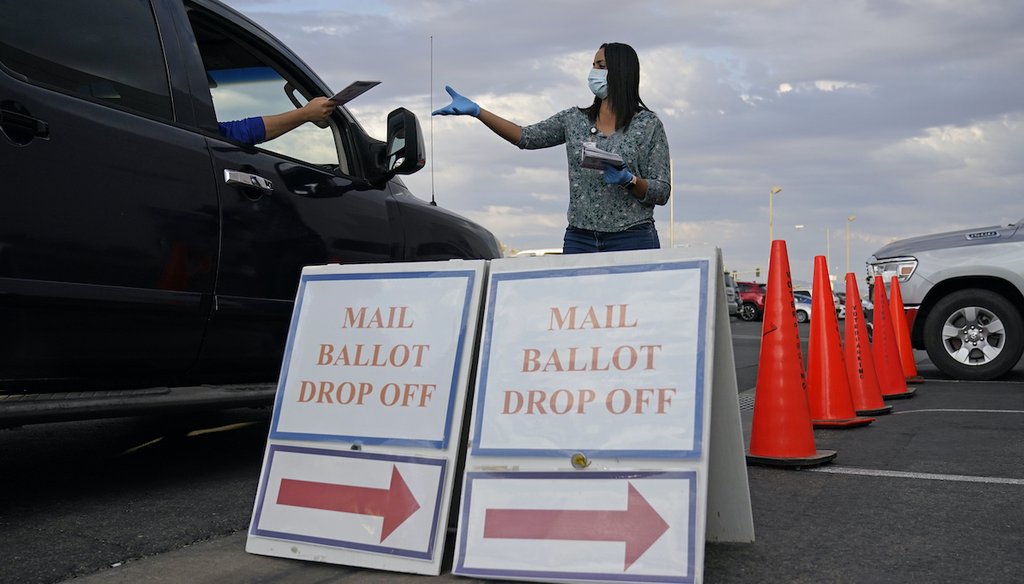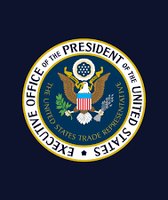Get PolitiFact in your inbox.

In this Nov. 2, 2020, file photo, a county worker collects mail-in ballots in a drive-thru mail-in ballot drop off area at the Clark County Election Department in Las Vegas. (AP)
Most states require signature verification for mail ballots
If Your Time is short
-
In 2020, 31 states had laws requiring signature matching for mail-in voting, according to the National Conference of State Legislatures.
-
States without signature matching requirements use other processes to verify absentee ballots, which may include providing photocopies of ID documents when returning the ballot, getting the ballot envelope signed by a witness, getting the ballot envelope notarized, or some combination of these steps.
-
Voter fraud, including for mail in ballots, is statistically rare among the millions of mail in ballots cast in each election cycle.
Former President Donald Trump generated loads of falsehoods about voting by mail in 2020 — a theme that continues to echo among some pundits and social media users who wrongly suggest that voting by mail lacks security provisions.
"Firearms dealers should be able to sell guns by mail without seeing the buyer or verifying the signature," states a July 19 Facebook post. "Just like mail-in voting."
The Facebook post was flagged as part of Facebook’s efforts to combat false news and misinformation on its News Feed. (Read more about our partnership with Facebook.)
The post uses a sarcastic setup and a comparison to guns to make a point about the security of mail-in voting. But its suggestion that mail-in voting requires no signature verification is wrong. Many states require signature verification for mail-in voting, and others have separate processes for checking the identity of the voter on a mailed ballot.
How states check identities for mail-in ballots
Voting by mail has grown in popularity in recent years with roughly half of voters doing so in the 2020 presidential election. Democrats who voted by mail far outnumbered Republicans, and after the election many GOP state lawmakers proposed or passed new restrictions on voting by mail.
Sign up for PolitiFact texts
The most common method to verify that absentee or mailed ballots are coming from the correct voter is signature verification or matching, according to Amanda Zoch, a policy specialist at the National Conference of State Legislatures, a policy research organization.
For 2020, 31 states had laws requiring signature matching, including some key battlegrounds where Trump and his allies disputed the results. The 31 are Arizona, California, Colorado, Delaware, Florida, Georgia, Hawaii, Idaho, Illinois, Indiana, Kansas, Kentucky, Maine, Massachusetts, Michigan, Montana, Nebraska, Nevada, New Hampshire, New Jersey, New York, North Dakota, Ohio, Oregon, Pennsylvania, South Dakota, Tennessee, Texas, Utah, Washington and West Virginia.
For example, Nevada election officials verified voter signatures on every ballot they received, according to the secretary of state’s website. If the signature was missing or the signature on the ballot return envelope didn’t match the signature on file, the ballot wasn’t counted until the voter took steps to verify their signature.
States without signature matching requirements use other processes to verify absentee ballots, which may include requiring photocopies of ID documents when returning the ballot, requiring that the ballot envelope be countersigned by a witness or notarized, or some combination of these steps, Zoch told PolitiFact.
There are several other steps election officials take to verify that a person who receives a mail ballot is an eligible voter. That starts with election officials regularly updating voter registration records by checking national change-of-address databases or death records.
"It is ludicrous for these individuals to suggest there are not security measures for mail ballots and clearly demonstrates a lack of understanding of state laws and election procedures," said Amber McReynolds, founding CEO of the Vote at Home Institute.
Steven Bellovin, a computer science professor and expert on security at Columbia University, wrote an essay in October 2020 about all of the steps taken to ensure security of mail-in ballots, starting with the first layer of defense: They are sent only to registered voters.
"These security measures bring the integrity of mail-in ballots to levels very close to those of in-person ballots, while also considerably increasing availability," Bellovin wrote. "In my business, we call that a net win for security."
Featured Fact-check
Voter fraud prosecutions — including related to mail ballots — are rare. When there has been evidence of voter fraud, it’s often in a local election, as was the case in a small city in Mississippi.
Bloomberg reporters recently contacted state officials nationwide to ask for evidence of voter fraud that led to court charges since the November 2018 elections and found about 200 cases. The reporters also examined news reports and the database of voter fraud cases compiled by the conservative Heritage Foundation. Their number may not reflect a full accounting nationwide since local prosecutors can make their own charging decisions, but it shows that voter fraud is rare.
Finally, a word about the post’s reference to gun sales by mail. Federal law requires that all retail firearm sales through a federally registered firearm dealer be completed face to face and include a signed background-check form, verification from the FBI’s National Instant Criminal Background Check System, and verification of ID and residency, said Mark Oliva, spokesperson for the National Shooting Sports Foundation.
Federal law places some limitations on the mailing firearms directly to purchasers across state lines without meeting in person or delivering the firearm through a licensed firearm dealer, according to Ari Freilich, state policy director at Giffords Law Center.
Our ruling
The Facebook post suggests that mail-in voting requires no signature verification.
As a blanket statement nationwide, that’s wrong. In 2020, 31 states required signature verification for mail in voting. The other states take other steps to ensure the security of mail in voting, starting with the voter registration process.
We rate this statement False.
RELATED: Fact-checking a misleading post on ID requirements for buying guns, voting
Our Sources
Facebook post, July 19, 2021
Giffords Law Center, Interstate & Online Gun Sales
National Conference of State Legislatures, VOPP: Table 14: How States Verify Voted Absentee Ballots, April 17, 2021
MIT Election lab, How we voted in 2020, March 2021
Nevada Secretary of State, Facts vs Myths, 2020
Columbia News, Mail-in Ballots Are Secure, Confidential, and Trustworthy, Oct. 23, 2020
Bloomberg, Sparse Voter-Fraud Cases Undercut Claims of Widespread Abuses, July 21, 2021
Wall Street Journal, How Do States Verify Signatures on Mail-In Ballots?’ Oct. 26, 2021
PolitiFact, Trump’s cascade of falsehoods about voting by mail, Nov. 1, 2021
PolitiFact, Facebook post gets it wrong on vote-by-mail under H.R. 1, March 31, 2021
PolitiFact, Tucker Carlson spins web of misleading claims as he alleges ‘meaningful voter fraud’ in Georgia, July 20, 2021
PolitiFact, Judge did order new election in small Miss. city after finding ballot problems, evidence of fraud, March 5, 2021
Email interview, Mark Oliva, spokesperson for the National Shooting Sports Foundation, July 29, 2021
Email interview, Ari Freilich, state policy director at Giffords Law Center, July 29, 2021
Email interview, Amber McReynolds, founding CEO of the Vote at Home Institute, July 29, 2021
Email interview, Amanda Zoch, a policy specialist at the National Conference of State Legislatures, July 29, 2021
Browse the Truth-O-Meter
More by Amy Sherman
Most states require signature verification for mail ballots
Support independent fact-checking.
Become a member!
In a world of wild talk and fake news, help us stand up for the facts.


















































